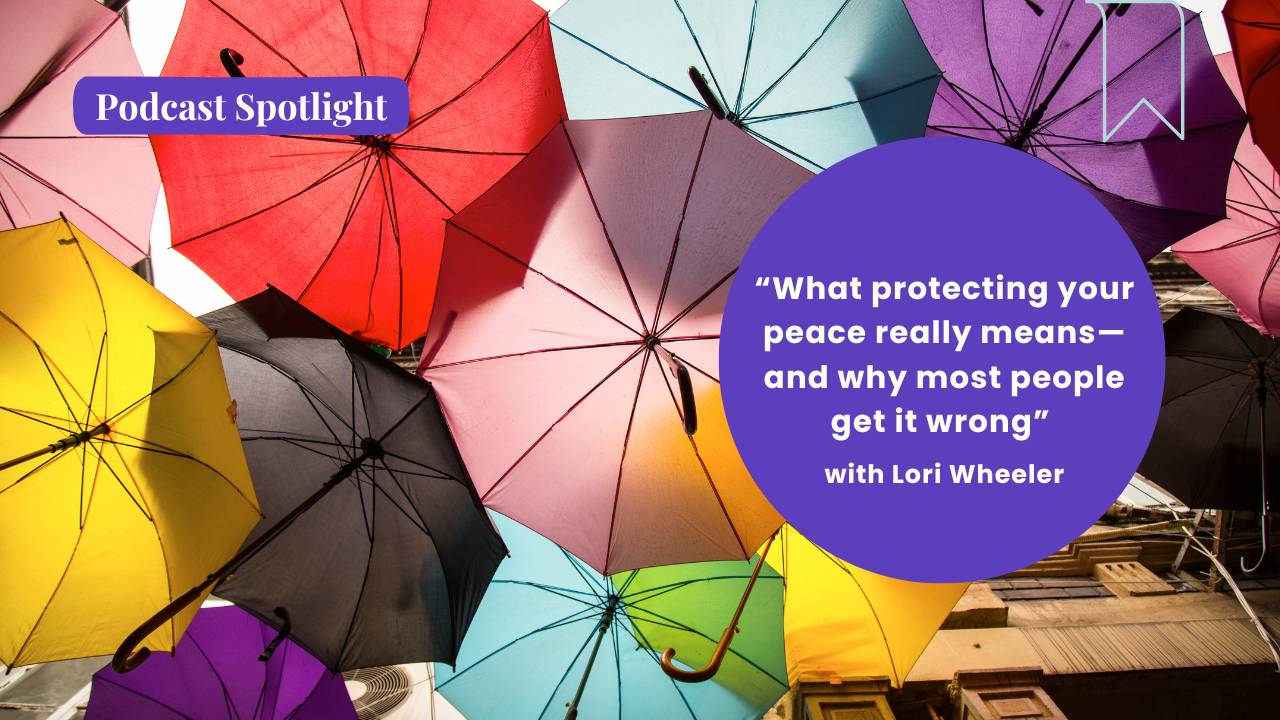Are you really protecting your peace—or just performing it?

Summary
Protecting your peace isn't about lighting a candle, pouring a bath, or throwing up a vague boundary meme on Instagram.
It's about discipline.
In this power-packed episode, Lori Wheeler tears down the performative façade of “peace culture” and rebuilds it from the roots. Using everything from personal traffic meltdowns to real-talk about guilt, ego, family dynamics, and expectations, she delivers the raw truth: peace is a practice, not a performance ritual. One that requires emotional maturity, pre-decided boundaries, radical honesty, and the courage to walk away without needing to be understood.
At the heart of Lori’s teaching is this: peace is neutral—not numb, not overjoyed. It’s the emotional clarity that comes from no longer needing to be right, validated, or constantly accessible. It’s not about removing triggers, it’s about learning how to sit with them and not activate.
She outlines the real reasons we lose our peace—people-pleasing, explaining ourselves into exhaustion, over-availability, unresolved ego—and offers tactical solutions for reclaiming it. From boundary scripts to energetic time audits, this episode gives you more than insight, it gives you a practice to try on for size.
If you’ve been craving an inner calm that feels steady and unwavering, this one’s a must.
Note: This summary is intended to support reflection and discussion on intentional living and leadership.
Key Takeaways
Peace requires discipline, not distance.
- Waiting to feel ready or hoping things change isn’t a strategy. Protecting your peace means acting from values, not vibes.
Your ego is the biggest peace thief.
- The need to be right, validated, or liked is usually ego in disguise. Learning to release that control is the most liberating move you can make.
Overexplanation is not a virtue—it’s an invitation for others to question your ‘no.’
- You don’t need to offer a thesis every time you honor your own bandwidth. “I’m not available” is enough.
Boundaries must be practiced in discomfort.
- Saying no, opting out, and walking away from old dynamics isn’t easy—but it’s essential.
You lose nothing real by protecting your peace.
- The people who are meant for you will adjust. The rest? Let them.
Reflection Prompts
Where in my life am I still explaining myself out of guilt or fear of judgment?
- Why this matters: Releasing the need to be understood by everyone is the gateway to living with peace and personal sovereignty.
What ‘peace leaks’ am I tolerating out of habit, obligation, or attachment?
- Why this matters: Group chats, drama cycles, and over-availability silently drain your energy. You’re not rude for disengaging…you’re responsible.
What boundary can I set this week that reflects the version of me I’m becoming?
- Why this matters: Boundaries aren't just protective, they’re creative. They shape your reality and build the space your next level needs to land.
Shared Resources
Free Workbook: “10 Steps to Letting Go: Reclaim Your Energy and Peace” by Lori Wheeler
Podcast Companion Episode: “How To Feel Your Feelings & Why You Want To”
- Also from the Positivity Xperience podcast—great for deeper integration of emotional neutrality and non-reactivity.
Additional Resources
- Podcast: “4 Ways Not to be Owned by Your Sh*t” with Susan David (Podcast: 10x Happier with Dan Harris)
- This episode explores emotional agility and how to reclaim your power through grounded responses, not reactive ones.
- Writing Exercise: “Exit Scripts”
- Write 2–3 scripts that reflect boundary-setting phrases you can use in real time (e.g., “I’m not in a space for that conversation right now.”)
- Write 2–3 scripts that reflect boundary-setting phrases you can use in real time (e.g., “I’m not in a space for that conversation right now.”)
Where to Listen
Invitation to Integrate
Values-based leadership flourishes when emotional intelligence is its foundation. This week, choose one of the EI insights that resonates—self-awareness, empathy, or regulation—and commit to practicing it intentionally in a real leadership moment.
Because trustworthy, transformative leadership is cultivated through emotional clarity, consistent integrity, and daily acts of connection.
Start now: "Download 5 Steps to Lead With Purpose and Confidence," your free guide to values-rooted leadership that helps you align your energy, clarify your direction, and say yes to what actually matters.
Download the guide here.
Subscribe to the Powerhouse Resource Recap
Leadership is louder than words—and this weekly drop delivers the tools to prove it.
Each potent edition gets you:
1 spotlight resource straight from the Powerhouse Resource Hub
1 actionable tool to sharpen your leadership edge
1 reflection prompt that’ll call you forward and fire you up
Because your inbox should feel like a vault of empowerment—not a sinkhole of distraction.




